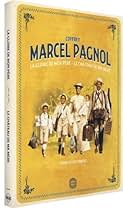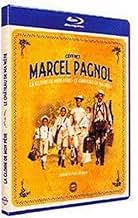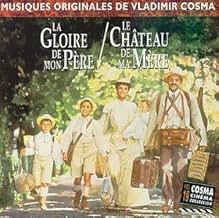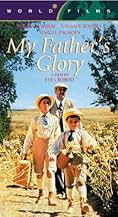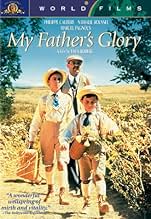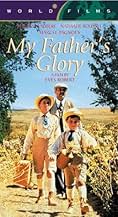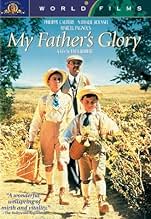IMDb रेटिंग
7.6/10
7.4 हज़ार
आपकी रेटिंग
उन्नीसवीं शताब्दी के अंत में, छोटा मार्सेल प्रोवेंस ग्रामीण इलाकों में अपने माता-पिता के साथ रहता है।उन्नीसवीं शताब्दी के अंत में, छोटा मार्सेल प्रोवेंस ग्रामीण इलाकों में अपने माता-पिता के साथ रहता है।उन्नीसवीं शताब्दी के अंत में, छोटा मार्सेल प्रोवेंस ग्रामीण इलाकों में अपने माता-पिता के साथ रहता है।
- पुरस्कार
- 2 जीत और कुल 5 नामांकन
फ़ीचर्ड समीक्षाएं
This is a movie for those who enjoy magic and nostalgia while floating away in childhood memories. It is the calm and enchanting story of the adventures of Marcel Pagnol. Julien Ciamaca does an outstanding job, he is handsome, naive and buoyant. The landscape and the narrative style make this movie, at least in my eyes, a real masterpiece. The entire story is full of nostalgia and deals with Marcel's very own perception of life. His friendship with Lili is honestly depicted and wonderfully staged. The boys do a great job, indeed. It is a tale that takes you back to contemporary France and revives the summer in the Provence region, a summer full of innocent joy and adventures. Inspiring and well-acted, the setting is beautiful and the music just perfect. All characters are well cast.
This is a very detailed description of the life of a French family. It is a sweet story gently told. It is about growing up, expanding horizons, the influence of friends and family members, enjoying happy times together, and reacting to life's inevitable problems. In this film we recognise moments in our own lives. The film has a universal theme.
In a documentary style the older son Marcel relates how his father Joseph a schoolteacher takes up positions in various parts of France and how before school-going age he sits at the back of the class and quickly learns how to read the text on the blackboard. Family life seems to revolve around teaching and the classroom until Aunt Rose meets Jules on a park seat and eventually marries him. After Jules joins the family circle father learns that there are more things in life than the educational system.
When the family rents a villa in a wild part of Provence, Jules instructs father on the use of the gun and they go on hunting sprees together. On one of these expeditions the son gets lost and meets up with a local boy about his own age. From him he learns about local birds, the eagles, the owls and scary stories about how these wild birds go for the eyes of their prey. This escape into the wild is a charming part of the family's life story and the final parting between the two boys when the family finally leaves is indeed moving.
The story is sprinkled with amusing incidents. For most boys the birth of a child is nothing short of a miracle. They conjecture that the navel is a kind of button which can be unbuttoned to let the baby out. And when father learns to shoot, Jules attaches a target to the outside toilet door. Father is delighted when he gets a bull's eye and Jules does well too. Not so the maid who happens to be inside the toilet at the time. Fortunately she emerges shaken but unharmed.
The film covers so much of French life. It is amazing how much is packed in. The story unfolds at an easy pace with beautiful music that never intrudes and scenery that astounds. I can recommend this little masterpiece about how wonderful family life can be.
In a documentary style the older son Marcel relates how his father Joseph a schoolteacher takes up positions in various parts of France and how before school-going age he sits at the back of the class and quickly learns how to read the text on the blackboard. Family life seems to revolve around teaching and the classroom until Aunt Rose meets Jules on a park seat and eventually marries him. After Jules joins the family circle father learns that there are more things in life than the educational system.
When the family rents a villa in a wild part of Provence, Jules instructs father on the use of the gun and they go on hunting sprees together. On one of these expeditions the son gets lost and meets up with a local boy about his own age. From him he learns about local birds, the eagles, the owls and scary stories about how these wild birds go for the eyes of their prey. This escape into the wild is a charming part of the family's life story and the final parting between the two boys when the family finally leaves is indeed moving.
The story is sprinkled with amusing incidents. For most boys the birth of a child is nothing short of a miracle. They conjecture that the navel is a kind of button which can be unbuttoned to let the baby out. And when father learns to shoot, Jules attaches a target to the outside toilet door. Father is delighted when he gets a bull's eye and Jules does well too. Not so the maid who happens to be inside the toilet at the time. Fortunately she emerges shaken but unharmed.
The film covers so much of French life. It is amazing how much is packed in. The story unfolds at an easy pace with beautiful music that never intrudes and scenery that astounds. I can recommend this little masterpiece about how wonderful family life can be.
This beautiful, charming work (and its companion MY MOTHER'S CASTLE) is lifted from the memoirs of filmmaker/screenwriter Marcel Pagnol.
It is a loving, romanticized recreation of Pagnol's childhood trips to the south of France.
Director Yves Robert ices every scene with sweet affection and a seemingly effortless attention to detail.
There are so many moving, heart-tugging scenes.
Describing them all would spoil the confection.
I'll mention one. Young Marcel accompanies his father, Joseph, a school teacher, to school one day. Not believing that Marcel can read already, Joseph writes a simple declaration of his love for Marcel on the blackboard. Marcel then surprises his father by reading out loud what his father wrote. It is such a touching, affecting scene.
MY FATHER'S GLORY is bursting to the seams with such magic.
Vladimir Cosma's score perfectly captures the period and tone of Pagnol's memories.
Simply exquisite.
It is a loving, romanticized recreation of Pagnol's childhood trips to the south of France.
Director Yves Robert ices every scene with sweet affection and a seemingly effortless attention to detail.
There are so many moving, heart-tugging scenes.
Describing them all would spoil the confection.
I'll mention one. Young Marcel accompanies his father, Joseph, a school teacher, to school one day. Not believing that Marcel can read already, Joseph writes a simple declaration of his love for Marcel on the blackboard. Marcel then surprises his father by reading out loud what his father wrote. It is such a touching, affecting scene.
MY FATHER'S GLORY is bursting to the seams with such magic.
Vladimir Cosma's score perfectly captures the period and tone of Pagnol's memories.
Simply exquisite.
Marcel Pagnol always wanted to adapt for the screen his childhood memories that he related in 4 novels. Unfortunately, he died without he made his plan. So, it was one of his friends, Yves Robert who undertook to make the coveted movie and the result turns out to be very convincing. Yves Robert's movie restitutes perfectly the atmosphere of Pagnol's book and he made a tender, hearty movie, lulled by Vladimir Cosma's nonchalant music where the shiny sun and sky of Provence reply to the wild beauty of the hills. These hills will make the little Marcel's enchantment. Thanks to a fluid making, Robert films the happiness and the naïvety of childhood with a certain impishness. Besides, Robert always enjoyed filming childhood like Truffaut and we particularly rediscover the quoted impishness in one of his movies: "la guerre des boutons". Robert introduces us the Pagnol's family and shows liking towards his characters. More than Marcel's character, these are his feelings towards his family which Robert tries to define, especially the pride towards his lucid and ambitious father (excellent Philippe Caubère) after his hunting achievement. Moreover, he loves tenderly his mother but tends to despise his uncle. He blames him for being a liar and a conceited person. At the end, a limpid movie that remembers with nostalgia of a past era. Pagnol would certainly have appreciated the result. If the movie introduces a bitter end, it depicts the last picture as something symbolic: " the glory of Marcel's father".
This film takes us back to 1900 and depicts a family with children who are refreshingly innocent, yet believable and amusing every step of the way. The story takes us on a journey with Marcel, the narrator, who thinks his father is superhuman and refuses to see him as anything less. To view life through Marcel's eyes is enchanting; he is so easily spellbound by his surroundings, so in love with the hills of his native Provence.
The cinematography is absolutely breath-taking, giving one the feeling of watching poetry in motion. The scene at the park on a Sunday afternoon is like watching a painting come to life. But cinematography is only a feather on the cap of this first rate production. The direction is superb, and the performances very touching.
I recommend this film highly. It is good as a visual sedative, and the only side effect it might have is a possible urge to quit your job, pack it up, and move to the French countryside writer Marcel Pagnol so loved.
The cinematography is absolutely breath-taking, giving one the feeling of watching poetry in motion. The scene at the park on a Sunday afternoon is like watching a painting come to life. But cinematography is only a feather on the cap of this first rate production. The direction is superb, and the performances very touching.
I recommend this film highly. It is good as a visual sedative, and the only side effect it might have is a possible urge to quit your job, pack it up, and move to the French countryside writer Marcel Pagnol so loved.
क्या आपको पता है
- ट्रिविया'La Gloire de mon père', published in France in 1957, is the first volume of four autobiographical novels by Marcel Pagnol. The second volume, 'Le château de ma mere', was published in 1958. In the novels, Marcel's meeting Lili takes place in volume two, as does Marcel's decision to stay at Provence as a hermit. The two novels were translated into English and published by Doubleday (in the U.S) as a single book in 1960 under the title 'The Days Were Too Short', This translation was reprinted by North Point Press as a single book titled 'My Father's Glory / and / My Mother's Castle' in 1986.
- गूफ़On the family's holiday, each time that it is raining the sky is bright and without a cloud (except the scene with the storm).
- भाव
Augustine: You need your gun to go shopping?
Joseph Pagnol: You never know.
टॉप पसंद
रेटिंग देने के लिए साइन-इन करें और वैयक्तिकृत सुझावों के लिए वॉचलिस्ट करें
- How long is My Father's Glory?Alexa द्वारा संचालित
विवरण
- रिलीज़ की तारीख़
- कंट्री ऑफ़ ओरिजिन
- भाषाएं
- इस रूप में भी जाना जाता है
- My Father's Glory
- फ़िल्माने की जगहें
- Signes, Var, फ़्रांस(bird hunting party)
- उत्पादन कंपनियां
- IMDbPro पर और कंपनी क्रेडिट देखें
बॉक्स ऑफ़िस
- US और कनाडा में सकल
- $17,30,856
- दुनिया भर में सकल
- $17,30,856
- चलने की अवधि1 घंटा 45 मिनट
- रंग
- पक्ष अनुपात
- 1.85 : 1
इस पेज में योगदान दें
किसी बदलाव का सुझाव दें या अनुपलब्ध कॉन्टेंट जोड़ें


![Bande-annonce [OV] देखें](https://m.media-amazon.com/images/M/MV5BNjNlYzQ0NGQtODdlNS00YzRmLTlhYzQtZDdiOTNiZDZlYWYzXkEyXkFqcGdeQXRyYW5zY29kZS13b3JrZmxvdw@@._V1_QL75_UX500_CR0)

